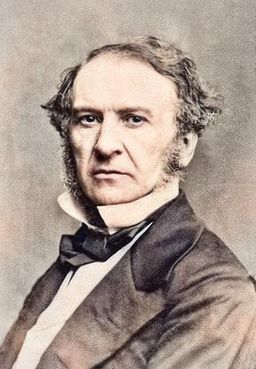
Slavery
Slavery was “the foulest crime that taints the history of mankind." William Gladstone
William Gladstone himself was never a slave trader. In the early 19th century his father, John Gladstone, along with many British merchants in the early nineteenth century, owned land in the West Indies and South America that used slave-labour.
John Gladstone received £106,769 in compensation at the time of the abolition of slavery. William himself received nothing as he was not involved in the slave trade business, which his father and elder brother were.
William Gladstone opposed the slave trade, though in 1831 he did speak in the Commons as a fledgling MP in favour of compensation for slave owners. As a result of the government's decision to do this, an end to slavery was achieved far sooner in the UK than in other countries such as the US. It was his first speech in the Commons and it is said that he was still very much under the influence of his father and a product of his upbringing to that point.
Furthermore, during his early career as a Conservative MP he proposed that the exisiting slaves should have apprenticeships, with time-off and an opportunity for education, in order to avoid civil unrest, and prepare them for independent life after which "with the utmost speed that prudence will permit, we shall arrive at that exceedingly desired consummation, the utter extinction of slavery.”
By 1850, he had substantially changed in his views on all aspects of the subject, through his journey to liberalism, and in Parliament. He described slavery as “by far the foulest crime that taints the history of mankind in any Christian or pagan country.”
Towards the end of his life he spoke of the abolition of slavery as one of the great political issues in which the masses had been right and the classes had been wrong. He is described as believing it to be a stain on national history and politics. Thus demonstrating a total shift on his understanding of and beliefs about human rights.
Gladstone said “I was brought up to hate and fear liberty. I came to love it. That is the secret of my whole career.” and in further acknowledgement that the ‘classes’ had been wrong he said that “all the world over” he “would back the masses against the classes”.
This website is committed to the works and memory of William Gladstone. It is an independent project. © Copyright. All rights reserved.

